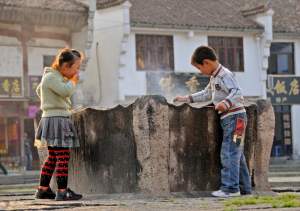Outdoor Scientific Inquiry in Urban Spaces
In preparation for Summer, Leslie Layman, coordinator of the Truman College Child Development Program, will discuss her favorite ideas for taking Math and and other STEAM ideas outside.

When thinking about using a scientific inquiry approach with young children, I often refer back to one of the guiding principles of the Reggio Emilia Approach: “Research represents one of the essential dimensions of life of children and adults, a knowledge building tension that must be recognized and valued.” I love this principle because it reminds me to focus on the fact that children and adults learn about their world in much the same way, and that tension and conflict is part of the learning process.
It might be easy to imagine how to take the idea of research and scientific inquiry outside, in a rural or suburban setting. You could research the amount and types of fish in a local pond, identify the source of the different insect sounds you hear on a hot summer day, or try to find out why the flowers in a field are different colors. As an early childhood teacher educator at City Colleges of Chicago, most of my ECE teachers are teaching in highly urban settings with limited access to outdoor space. I want to share some ideas for taking scientific inquiry outside in these urban spaces.
In my Science and Math for Young Children course, I have my students invent the definition of science. They typically start by naming concepts related to science; animals, experiments, chemistry. As we continue to discuss, they usually independently come up with some kind of statement about questions and answers. The definition from Merriam-Webster is: “knowledge or a system of knowledge covering general truths or the operation of general laws especially as obtained and tested through scientific method.” To me this is what makes scientific inquiry such a beautiful match for early childhood; we don’t have to teach or control much, children naturally do it. They are born hardwired to build knowledge, through testing the world, to find general truths and laws about how things work.
When we start to operationalize what scientific inquiry might look like in an urban educational setting with a group of small children, I sometimes see things fall apart. Here are some of the missed opportunities I often see when teachers try to do science with young children.
Science Fairs and Wacky Experiments: I love science fairs and experiments, but sometimes I see teachers do a “Big Day for Science” in which they invite parents or experts to do big, wacky experiments (I’m looking at you baking soda volcano). These are fun and fine as long as they don’t take the place of everyday inquiry and investigations.
Adult-Led Investigations: No more bean sprouts in a Ziploc bag. Unless a group of children comes to you legitimately interested in how bean sprouts grow and what their roots look like, don’t do it. In order to keep children motivated, and to support them to really use the process of inquiry, it must be the children who choose the question and plan how to find the answer themselves. You are but a guide and resource along the way.
Nothing but Biology: Many children love plants and animals, but not all do. There are many amazingly interesting scientific disciplines: astronomy, physics, chemistry, microbiology, neuroscience. Let the children explore the full range of what it means to be a scientist.
So how do we take it outside when we don’t have big, open, natural spaces? First and foremost, children need exposure to the outdoors, whatever that means for your location. Walks around the block or on bike paths, trips to nearby garden centers, playing at a city park or local school basketball court.
Once we get kids outdoors, we have to really, really listen for the questions they have about the world around them, and then help them dig in. How does a fire engine make noise? How does our local baker make the muffins rise? Where does the steam coming out of the manholes come from? How does the spinner at the playground spin? Why does a basketball bounce? Why do worms come out when it rains? It is important to know too, that you do not need to be an expert in all areas of science. You need to be the primary investigator, who can evaluate and reform the question to make it more meaningful, find and vett resources and references, create an experiment, take data, and reflect and iterate.
I think that you will find that if you begin following your children’s lead and investigate through their interests that doing science becomes not only easier, but leads to deeper and more meaningful learning.